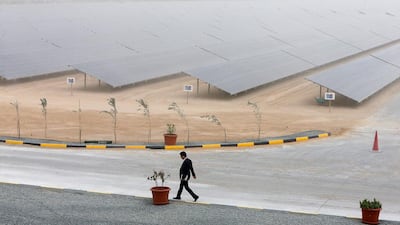Concerted global efforts are needed to protect our planet from the negative impact of global warming and to ensure a sustainable future. The UAE effectively contributes to achieving the United Nations Sustainable Development Goals for 2030. This country has been at the forefront of implementing strategies that support sustainability, under the leadership of Sheikh Khalifa, the President, Sheikh Mohammed bin Rashid, Vice President and Ruler of Dubai, and Sheikh Mohammed bin Zayed, Crown Prince of Abu Dhabi and Deputy Supreme Commander of the Armed Forces.
Although the UAE has some of the largest oil reserves in the world, the leadership attaches great importance to diversifying energy sources, by increasing the share of renewables and clean energy. This supports the vision that recognises the importance of renewable energy in balancing development and the environment. The UAE has made progress based on federal and local strategies and initiatives, including the UAE Vision 2021, the UAE Centennial 2071 and the UAE Energy Strategy 2050, which sets a 50 per cent target for clean energy in the total energy mix by 2050, among others.
Dubai has a comprehensive vision for the future of sustainability, which it considers essential to the success of its transition towards a green economy. The Dubai Clean Energy Strategy 2050 aims to provide 75 per cent of the emirate’s total power output from clean energy sources by that date, to establish a sustainable energy model that supports economic growth, without damaging the environment and its resources, and to make Dubai the city with the lowest carbon footprint in the world.
Dubai Electricity and Water Authority supports this direction by developing leading clean and renewable energy projects. These include the Mohammed bin Rashid Al Maktoum Solar Park, which is the largest single-site solar park in the world (based on the Independent Power Producer model). It will produce 5,000 MW by 2030, after a total investment of Dh50 billion. When completed, it will reduce carbon emissions by more than 6.5 million tonnes annually.
____________________
Read more from Opinion
Gen Z are the ambassadors of sustainability for the future
__________________
The first phase became operational in 2013. The second phase of the solar park was launched in March 2017. The 800MW photovoltaic third phase will be operational by 2020 in co-operation with the Masdar-led consortium and Électricité de France. We have also launched the 700MW fourth phase of the solar park. In a pioneering step to diversify energy sources, Dewa is working on the implementation of a pumped-storage hydroelectric power station, making use of the water stored in Hatta Dam. The 250MW project is the first of its kind in the GCC countries.
In addition to our solar energy projects, we are working to engage citizens and residents in the production of clean energy through Shams Dubai. The initiative encourages building owners to instal solar panels to produce electricity. Up until the middle of December 2017, Dewa has connected 548 buildings in Dubai, with a total capacity of 20.1MW. We are working to double the number in the future, reaching all Dubai buildings by 2030. In addition to Shams Dubai, Dewa has also launched the smart meters and grids initiative and the green charger initiative to establish the infrastructure and charging stations for electric vehicles to encourage their use. So far, Dewa has installed 100 charging stations across the emirate and will double this in 2018.
Through our strategies, initiatives and joint projects with the private sector, we promote the sustainable development of the UAE and aim for sustainability to be a lifestyle, to ensure a brighter and more sustainable future for generations to come. I commend the efforts of Abu Dhabi Sustainability Week, for supporting the vision of our wise leadership and enhancing joint efforts to make the UAE rank first in all fields. As Sheikh Mohammed bin Rashid once observed, "Working as a team, everybody takes part in building the UAE."
Saeed Mohammed Al Tayer is managing director and CEO of Dubai Electricity and Water Authority. He will be one of the speakers during Abu Dhabi Sustainability Week, which begins on January 13

